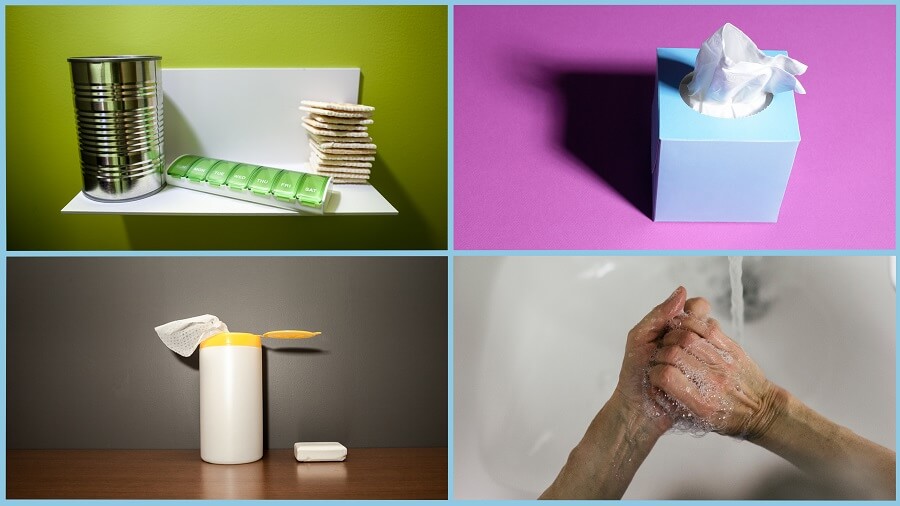Touching your face can increase your risk of infection with the new coronavirus. The eyes and mouth are areas where viruses can quickly enter your body.
Most of us touch our faces countless times every day. When our noses itch, we feel tired or even wipe our mouths with the back of our hands without even thinking about it.
In 2015, a study from a Sydney university recorded how many times students touched their faces during classes. The average was about 23 times per hour. Also, almost half of those times involved contact with the eyes, nose, or mouth.
During the pandemic, several experts, including the WHO, have recommended avoiding touching your face to reduce the spread of COVID-19. (7) What do they say?
How to avoid touching your face?
Touching your face is a habit, and any pattern can be broken. According to experts Kevin Chapman and Zachary Sikora, there are several steps you can take to achieve this. Below you can read their tips to avoid touching your face:
- Use disinfectants or scented soaps
Using a sanitizer or scented hand soap will help remind you to keep your hands away from your face. The scent will draw attention to the location of your hands and prevent you from bringing them to your mouth or eyes.
- Keep your hands busy.
If you are at home watching television, try folding your clothes, holding objects in your hands, crossing your arms, joining your fingers, using stress balls, knitting, or any other relaxing activity. This will keep your hands busy and prevent you from bringing your hands to your face.
- Wear gloves
It may seem strange but wearing gloves is a way to learn not to touch your face, especially when you go shopping or leave the house. If you haven’t yet developed the ability to avoid touching your face, the rubbery texture of gloves can help you tell when you do.
Even wearing gloves indoors is an effective way to learn not to touch your face.
- Change your thinking
According to psychologist Kevin Chapman, founder and director of the Kentucky Center for Anxiety and Related Disorders, you are more likely to change your habits when you allow your thoughts to be flexible rather than punitive.
So instead of thinking, “Don’t touch your face,” you should say to yourself, “I’m going to be more aware of touching my face today.”
“If you do it consistently, you are programming your brain to bring that thought out, and therefore more aware of not doing it,” says Chapman.
When you still touch your face, use it as a reason to wash your hands and start from scratch.
- Avoid stressful situations
Several investigations have confirmed that a person increases the number of times they touch their face and the duration of the touch under stressful situations. (2,3,4)
These studies have shown that self-touches (touching the face) increase when negative emotional states such as stress occur. Including relaxation techniques such as meditation, physical exercise at home, and entertainment such as reading, watching movies, etc., can help avoid touching your face.
- Use reminders
In Illinois, clinical psychologist Zachary Sikora from Northwestern Medicine Huntley Hospital advised using reminders to avoid touching your face during the coronavirus outbreak. (5)
Zachary claims that posting reminders in the form of sticky notes or even on your phone is a handy way to remind yourself to keep your hands away from your face. Placing directives where you can see them, on the refrigerator or even in front of the television or computer, is an easy method to get rid of this habit.
- Use accessories
Wearing a new hand accessory can remind you to avoid touching your face. According to expert psychologists, wearing watches and ring bracelets that you are not used to is a way to help the mind to rid itself of automatic behaviors.
If you also have to wear glasses for vision, this is the best time to get them started. The lenses will protect against contamination in the eyes when bringing the hands to the face.
Washing your hands and not touching your face – Two fundamental habits during the pandemic
Washing hands and maintaining social distance remain the most effective ways to reduce the effects of the pandemic.
However, we touch our faces so frequently that the chances of re-contaminating our hands between washes are incredibly high.
All it takes is touching a doorknob or similar surface, and you are again in danger of infection. – Declares Healthline magazine (5)
According to the WHO, the new coronavirus, also called SARS-CoV-2, is transmitted from person to person, like many other respiratory infections.
In most cases, it is through respiratory droplets produced when someone sneezes. Touching a surface contaminated with viruses and using that hand to touch your eyes or mouth is one of the leading causes of infection.
While it is easy to avoid being around someone sick, it is more difficult to prevent the virus when it is on the surface. So avoiding touching your face plays an essential role in these cases.
Why do we touch our faces?
Touching the face, changing your posture, and manipulating objects and gestures are types of self-regulating movements associated with psychological and cognitive processes. (2,3,4) Lack of concentration and stress could be the primary triggers.
Self-touching movements are generally performed with one or both hands and involve rubbing, scratching, stroking, or touching any part of the body’s surface, clothing, or accessories.
While scientists have yet to determine what causes us to touch our faces, it may be part of a sophisticated neural mechanism.
Immediately before a self-touch, the brain will send a sensory signal to the skin without external dermal stimulation. The excitation of the dermal receptors that cause sensations on the skin could manifest as itching. (2)
ABSTRACT
- Washing your hands frequently and avoiding touching your face are two essential habits to prevent a new coronavirus infection.
- Experts say that simple methods like using scented soap or disinfectant, gloves, and accessories can help keep your hands from reaching your face.
- Touching your face is related to stress. Managing stress skills will make you feel your face fewer times per day.







